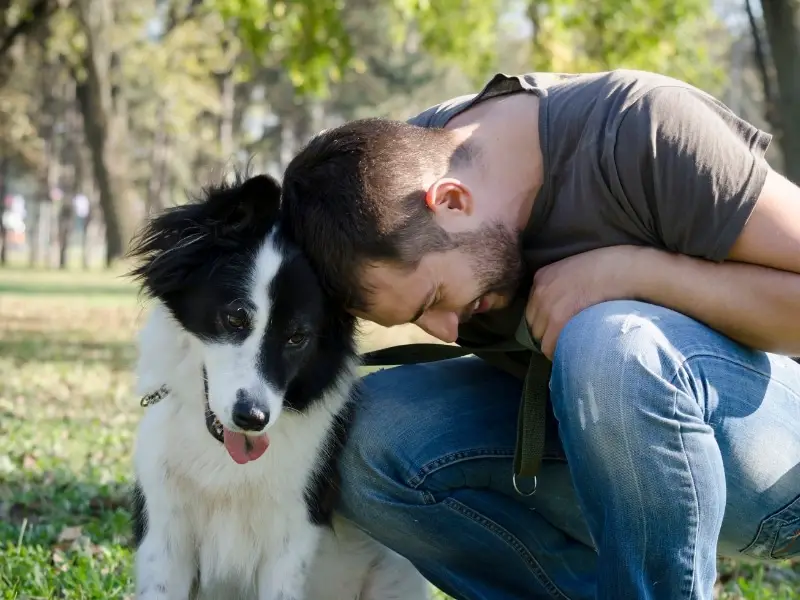There is often contention between pet owners and those with no pets as to whether or not dogs understand feelings or even have feelings beyond the physical sensation of pain. So it seems reasonable to ask, “Do dogs miss family members?”
Dogs miss family members, grieve, and understand when you or a loved one is absent, even if it is only for five minutes. Studies show animals, in particular dogs, as having emotions. They feel, love, and grieve, only they can not express it in words.
This article will discuss canine emotions such as love, empathy, and, yes, even grief. Read on to learn if dogs do miss you when you are gone or if they miss a family member that has passed away, whether they grieve for that family member, and how they deal with their grief.
Do Dogs Understand the Concept of Absence?
Many pet owners will tell you they believe their dog feels and expresses emotion. They can give innumerable examples of times their dog has shown such feelings. The logic is if humans love and grieve, why not dogs?
Thanks to the domestic dog’s co-evolving with humans, dogs understand each other and humans. Dogs communicate through their eyes, facial expressions, vocalization, body language, as well as scent and taste.
The ability dogs developed to understand and communicate with humans is one of the reasons dogs are such great companions. Dogs want you to be with them all the time and miss you when you go out, even if it is just to the mailbox.
Some dogs will develop separation anxiety anytime they are not in the presence of their owner.
Separation Anxiety

Separation anxiety is a condition dogs exhibit when they are away or separated from their owners. While their behaviors appear to be due to disobedience or inadequate training, this is far from what is happening.
Dogs become very attached to their family members and can panic when left alone, even if there are other animals in the house.
This behavior tends to be displayed more often by dogs that have been adopted rather than raised from puppyhood in the same home.
There is a scientific consensus that the loss of an important person or group of people, such as an entire family, from the dog’s life, may lead to the development of separation anxiety (source).
The change in a dog’s routine does not necessarily need to be dramatic; any change is significant to a dog.
A dog may be distressed for many reasons — for example, a change in their situation, such as being surrendered and then adopted. A disruption in their routine or schedule is a cause for stress as dogs thrive on routine.
Another possible cause is the family moving to a new home; unfamiliar surroundings cause dogs to be uncertain, leading to stress and behavior issues.
One of the biggest causes of stress and depression for a dog is the absence of a loved family member, whether it is due to death, a family member moving out of the home, or being absent for an extended period.
There are four categories of behavior a dog may display, which will alert you that something is distressing your dog. These four categories are exploratory behavior, object play, destructive behavior, and vocalization.
The behaviors may manifest through destructiveness, going potty in the house, and consistent barking. These behaviors will often manifest within the first few minutes of their owner’s absence and often as their owner is preparing to leave.

Depression
A dog may display signs of depression or anxiety right before their owner goes out. If a beloved family member is absent for an extended period, your dog may soon show signs of depression.
Signs of canine depression include a change in appetite as well as a loss of interest in otherwise enjoyable activities such as playing or walking. They may sleep excessively, attempt to soothe themselves through paw licking, and even avoid you or hide (source).
Always consult your veterinarian when your dog is behaving out of character. Still, if your dog is depressed, there are therapies available to help your dog cope with their new circumstances.
Do Dogs Grieve?
There is very little doubt that dogs grieve. Whether they have lost a beloved family member or another dog in the family, they feel the loss, often resulting in a long grieving period. While it is not likely they feel as profoundly as humans, they exhibit signs of emotional distress.
Dogs, like humans, remember things and loved ones through deep emotional ties. Dogs understand human emotion and display this understanding in many ways, from tail wagging to licking you all over to contentedly lying at your feet. The longer you and your dog are together, the stronger the bond becomes.
When their owner is no longer present in their day-to-day lives, the dog may become confused and sad. As humans, we can not explain to our dogs where that person has gone and why or even if they will be back.
Every dog displays emotion differently. Signs of grieving in a dog are similar signs of depression and anxiety. Watch for panting, whining, barking, pacing, and fidgeting more than is usual. Other signs of grief include a loss of appetite, weight loss, lack of energy, listlessness, clinginess, and loss of interest in otherwise normal activities (source).
Dogs are very intelligent, intuitive, and highly sensitive. Their devotion and love, once given, last for the duration of their life, and they notice if a loved one is no longer there to give it to.
Do Dogs Mirror Human Emotion?
Studies conducted by Dr. Marc Bekoff show solid evidence that dogs do mirror human emotion. Brain imaging scans proved that when feeling an emotion parallel to a human’s, similar areas of the brain light up.
This study makes sense if you have ever experienced a dog consoling you when you are sad or crying. If you have ever wondered if your dog was attempting to make you feel better by licking away your tears, check out “Why Does My Dog Lick My Tears?”
How Do Dogs Deal With Loss?
Dogs grieve, and while no two dogs will grieve exactly alike, there are things you can do to ease their pain.
During their period of grief, you need to be very sensitive to their needs. If a loved one has passed and you know what their routine was, do your best to stick to it. If you have adopted a dog, establish a routine as quickly as possible. Routine makes them feel loved and safe.
Provide the dog with lots of extra attention, love, and pets. Spending time with them in their time of grief will not only make them feel better, but it will also increase the bond they feel with you.
Also, giving your dog plenty of exercise, such as walking or running, combats depression. If you know their favorite game, endeavor to play that game as often as you can.
Final Thoughts
Dogs feel emotion and loss. They develop separation anxiety even if you are away from them for a short time every day. Dogs develop depression when they have experienced a loss, especially of an owner or other animal in the house.
When dogs feel a loss, they grieve, and, similar to humans, it is for an unspecified period. Despite how long your dog grieves, extra love and attention from you during that time will make a difference in their recovery.


0 Comments